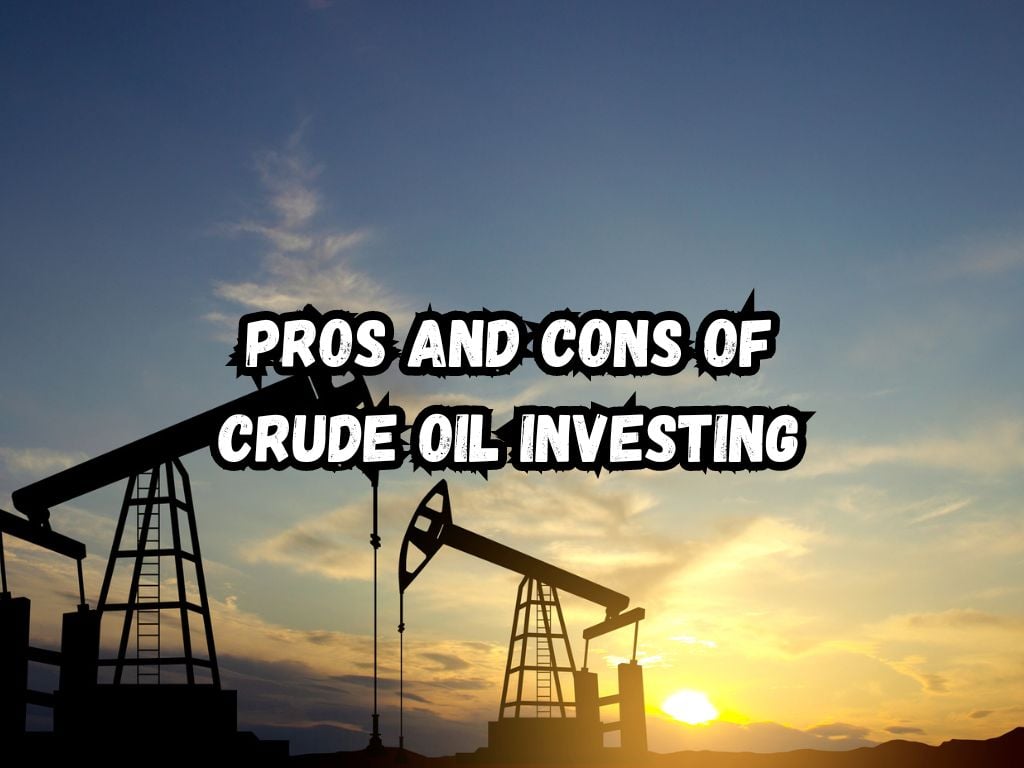Investing in crude oil is like setting sail on the high seas. The potential for reward is vast, but so too is the risk of rough waters.
As a staple commodity fueling the world’s economy, crude oil presents unique opportunities and challenges for investors. This article delves into pros and cons of crude oil investing, offering a balanced view to those considering this venture.
Pros and Cons of Crude Oil Investing
The Pros of Crude Oil Investing
High Demand: The global economy runs on energy, and crude oil is its lifeblood. The demand from industries, transportation, and countries developing their infrastructure ensures a continued need for oil.
This persistent demand can translate into steady opportunities for investors.
Portfolio Diversification: Diversification is a fundamental investment principle. By spreading investments across different asset classes, investors can reduce risk.
Crude oil, with its unique market dynamics, offers an excellent diversification option. It often moves independently of stocks and bonds, providing a valuable hedge in volatile times.

Inflation Hedge: Inflation diminishes the value of currency over time, but tangible assets like crude oil can protect against this loss.
Historically, commodities have held up well against inflation. As prices rise, so too can the price of oil, offering investors some measure of protection.
Profit Opportunities: The crude oil market is known for its volatility, which can spell profit for the savvy investor. Price swings create opportunities to buy low and sell high. Such potential is a significant draw for those willing to navigate the market’s complexities.
The Cons of Crude Oil Investing
Volatility: What makes crude oil investing potentially profitable also makes it risky. Prices can fluctuate wildly due to geopolitical tensions, supply disruptions, or changes in energy policy.
Such volatility requires a strong nerve and a keen market sense, qualities not all investors possess.
Market Risks: Crude oil investing is subject to a broader range of risks. Geopolitical issues in oil-producing regions can have immediate and unpredictable effects on prices.
Furthermore, the global push towards renewable energy sources poses long-term risks to the demand and, subsequently, the price of oil.
Investment Complexity: The crude oil market can be daunting for newcomers. Its intricacies, influenced by global politics, economics, and environmental policies, require a deep understanding to navigate effectively. This complexity can be a barrier to entry for many potential investors.
Environmental Concerns: Investing in crude oil means investing in a fossil fuel, a choice increasingly scrutinized for ethical and environmental reasons.
With the global community focusing on reducing carbon emissions, some investors may find crude oil’s environmental impact incompatible with their values.
How to Invest in Crude Oil
Investors can approach crude oil investment through various avenues, each with its own set of considerations.
- Direct investments in physical oil are impractical for most, given the logistics and costs of storage and transportation.
- Investing in stocks and ETFs related to the oil industry offers a more accessible route. Companies engaged in exploration, production, and distribution of oil allow investors to gain exposure to the market without dealing directly with the commodity.
- Futures Contracts represent agreements to buy or sell oil at a future date at a predetermined price. While they offer high leverage and the potential for substantial returns, they also carry a high risk, especially for those unfamiliar with futures trading.
Stay Informed
Knowledge is power in the volatile crude oil market. Stay ahead by monitoring global economic indicators, geopolitical developments, and advancements in renewable energy. Understanding these factors can provide critical insights into future market movements.
Risk Management
Crude oil’s volatility necessitates a solid risk management strategy. Diversify investments, use stop-loss orders, and only allocate a portion of your portfolio to oil. Such measures can help mitigate potential losses without forgoing the opportunity for significant gains.
Long-Term Perspective
Patience pays in the crude oil market. While short-term fluctuations can be tempting, a long-term investment horizon reduces the pressure of immediate market swings.
Sustainable investment in oil requires looking beyond the daily news cycle to the broader economic and energy landscape.

Frequently Asked Questions
Is crude oil investing suitable for beginners?
For beginners, the complexity and volatility of crude oil investing present significant challenges. Starting with more accessible options like stocks of oil companies or ETFs can provide exposure to the oil market with less risk.
How does crude oil investing impact the environment?
Investing in crude oil supports an industry that has significant environmental impacts, from greenhouse gas emissions to oil spills. This consideration is increasingly important to many investors focusing on sustainable and ethical investments.
What are the signs of a good crude oil investment opportunity?
Good investment opportunities often arise from careful analysis of market trends, geopolitical developments, and advancements in technology affecting oil demand and production. Timing, market knowledge, and a clear understanding of risk are crucial.
How does geopolitical tension affect crude oil investments?
Geopolitical tensions in oil-producing regions can lead to supply disruptions, affecting global oil prices. Such events can cause immediate price spikes, presenting both opportunities and risks for investors.
Conclusion
Investing in crude oil is not for the faint of heart. It requires a balance of knowledge, strategy, and risk tolerance. Yet, for those willing to chart its choppy waters, crude oil offers a unique combination of challenges and rewards.
Armed with a deep understanding of both its pros and cons, investors can make informed decisions, potentially paving the way to profitable ventures in the energy market.


 Tags:
Tags:










